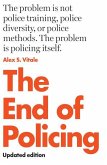In this provocative new book, Richard Ericson and Kevin Haggerty contend that the police have become information brokers to institutions such as insurance companies and health and welfare organisations that operate based on a knowledge of risk. In turn, these institutions influence the ways that police officers think and act. A critical review of existing research reveals the need to study police interaction with institutions as well as individuals. These institutions are part of an emerging "risk society" where knowledge of risk is used to control danger. The authors examine different aspects of police involvement; the use of surveillance technologies, and the collection of data on securities, careers, and different social, ethnic, age, and gender groups. They conclude by looking at how police organisations have been forced to develop new communications rules and technologies to meet external demands for knowledge of risk. With this book, the authors revolutionise the study of policing, and their work will impact heavily on scholars in criminology, social theory, and communications as well as policing and the public.
Hinweis: Dieser Artikel kann nur an eine deutsche Lieferadresse ausgeliefert werden.
Hinweis: Dieser Artikel kann nur an eine deutsche Lieferadresse ausgeliefert werden.








